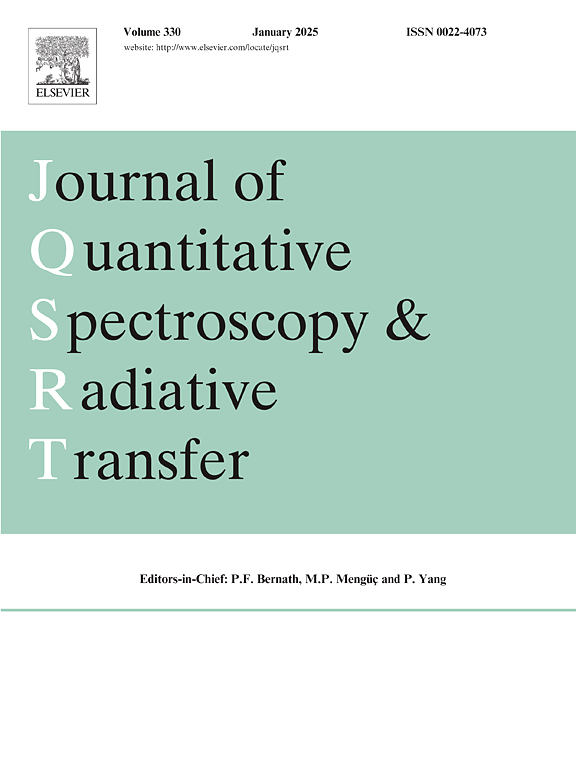Multispectral stealth structures for simultaneous visible-infrared stealth and efficient heat dissipation
IF 2.3
3区 物理与天体物理
Q2 OPTICS
Journal of Quantitative Spectroscopy & Radiative Transfer
Pub Date : 2025-02-19
DOI:10.1016/j.jqsrt.2025.109397
引用次数: 0
Abstract
Multispectral compatible stealth technologies are critically important in complex warfare environments, as they can effectively deceive various types of detection equipment, including visible light cameras and infrared thermal imagers. However, the integration of multiple stealth functionalities entails increasingly complex design requirements, posing significant challenges to the design of multispectral stealth structures. Herein, a metamaterial structure, composed of single-layer grating and multilayer films, are successfully designed to achieve visible-infrared stealth and efficient heat dissipation. This metamaterial supports visible stealth (0.38–0.78 μm), two–band infrared stealth for both 3–5 μm and 8–14 μm bands and enhances heat dissipation via two non-detection bands at 5–8 μm and 14–17 μm as well. This is demonstrated through the possibility of designing surfaces with different colors matching with background environment while simultaneously achieving minimal emissivity in the 3–5 μm and 8–14 μm bands (only 0.15 and 0.22, respectively) and significant emissivity in the non-detection bands at 5–8 μm and 14–17 μm (reaching 0.79 and 0.72, respectively). This research not only offers theoretical insights for designing metamaterial that combines visible–infrared stealth and heat dissipation but also provides valuable ideas and methodologies for the broader field of radiation regulation research.
同时实现可见光-红外线隐身和高效散热的多光谱隐身结构
多光谱兼容隐身技术在复杂的战争环境中至关重要,因为它们可以有效地欺骗各种类型的探测设备,包括可见光摄像机和红外热成像仪。然而,多种隐身功能的集成带来了越来越复杂的设计要求,对多光谱隐身结构的设计提出了重大挑战。本文成功设计了一种由单层光栅和多层薄膜组成的超材料结构,实现了可见-红外隐身和高效散热。该材料支持可见光隐身(0.38-0.78 μm), 3-5 μm和8-14 μm波段的两波段红外隐身,并通过5-8 μm和14-17 μm两个非探测波段增强散热。这可以通过设计与背景环境相匹配的不同颜色表面来证明,同时在3-5 μm和8-14 μm波段实现最小的发射率(分别为0.15和0.22),而在5-8 μm和14-17 μm的非检测波段实现显著的发射率(分别为0.79和0.72)。该研究不仅为设计集可见-红外隐身和散热于一体的超材料提供了理论见解,而且为辐射调节研究提供了有价值的思路和方法。
本文章由计算机程序翻译,如有差异,请以英文原文为准。
求助全文
约1分钟内获得全文
求助全文
来源期刊
CiteScore
5.30
自引率
21.70%
发文量
273
审稿时长
58 days
期刊介绍:
Papers with the following subject areas are suitable for publication in the Journal of Quantitative Spectroscopy and Radiative Transfer:
- Theoretical and experimental aspects of the spectra of atoms, molecules, ions, and plasmas.
- Spectral lineshape studies including models and computational algorithms.
- Atmospheric spectroscopy.
- Theoretical and experimental aspects of light scattering.
- Application of light scattering in particle characterization and remote sensing.
- Application of light scattering in biological sciences and medicine.
- Radiative transfer in absorbing, emitting, and scattering media.
- Radiative transfer in stochastic media.

 求助内容:
求助内容: 应助结果提醒方式:
应助结果提醒方式:


